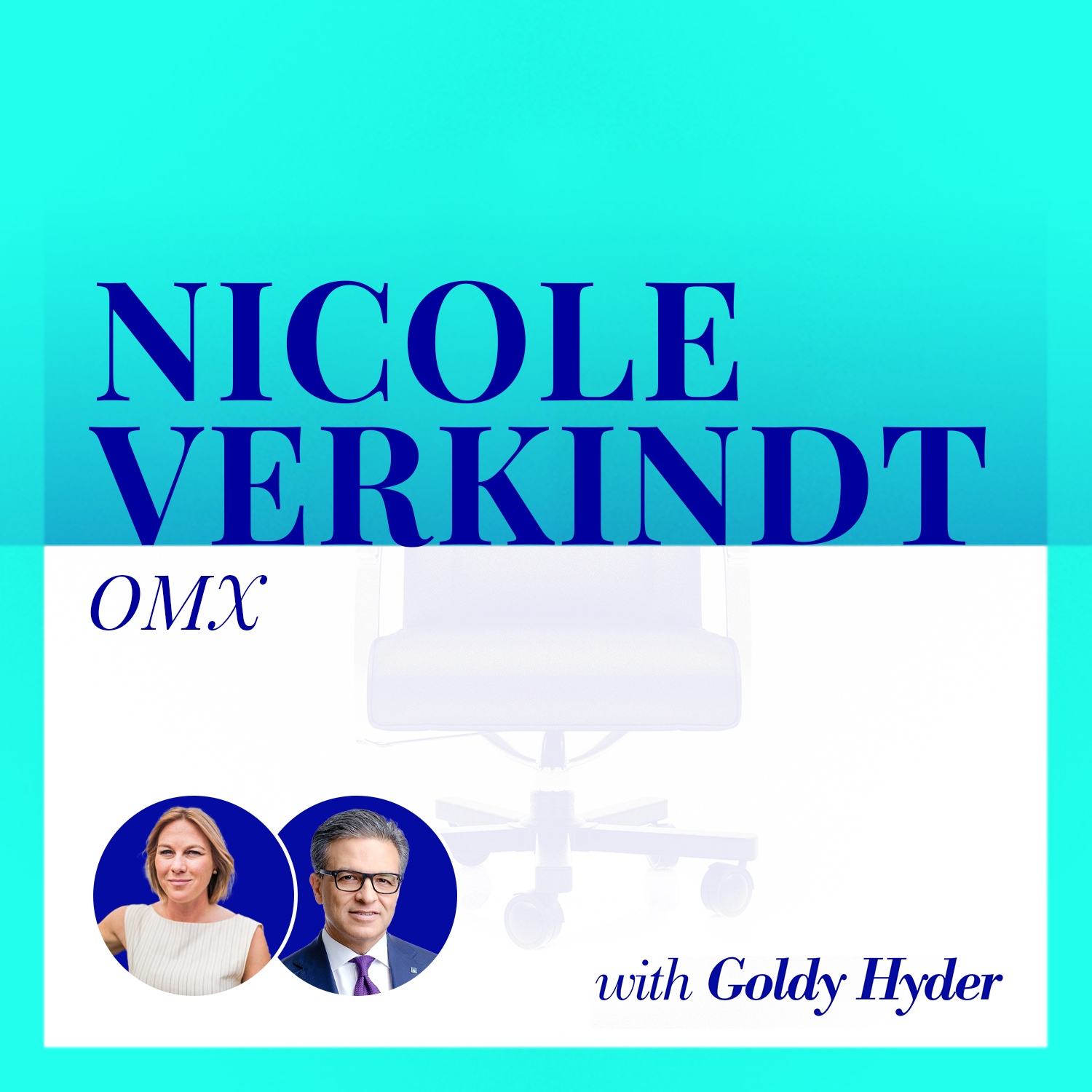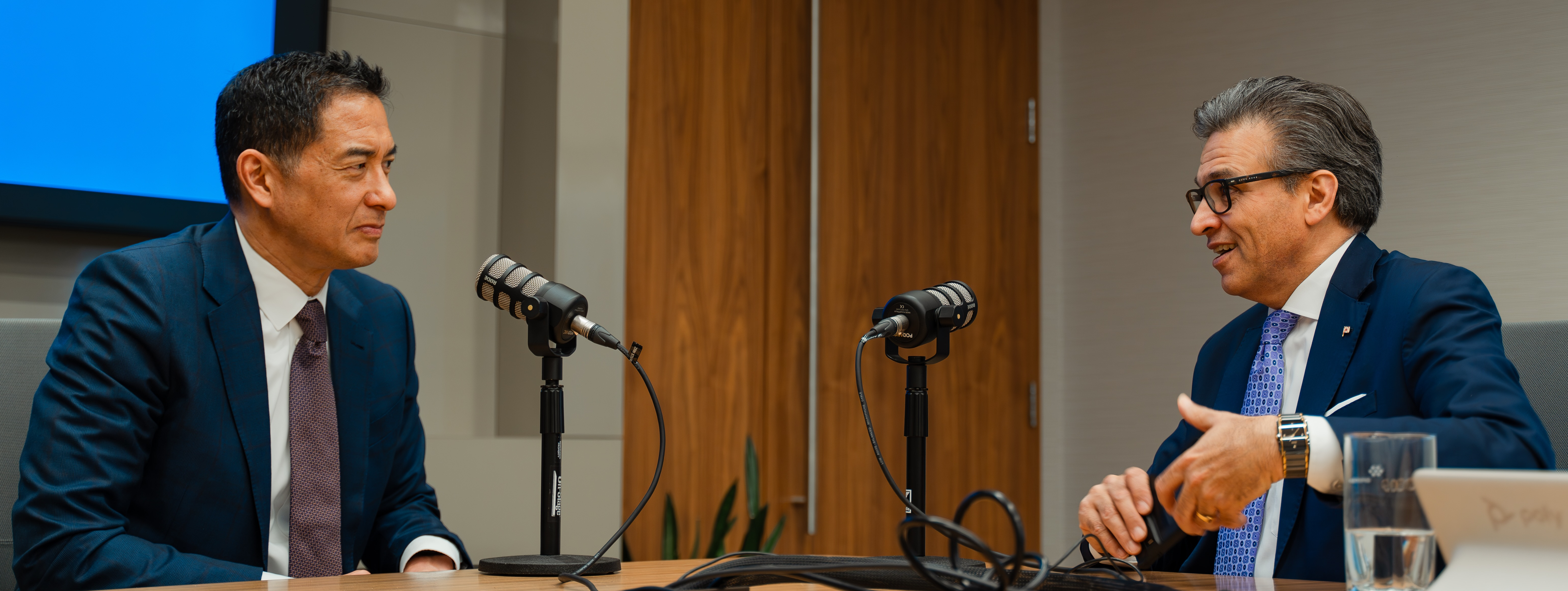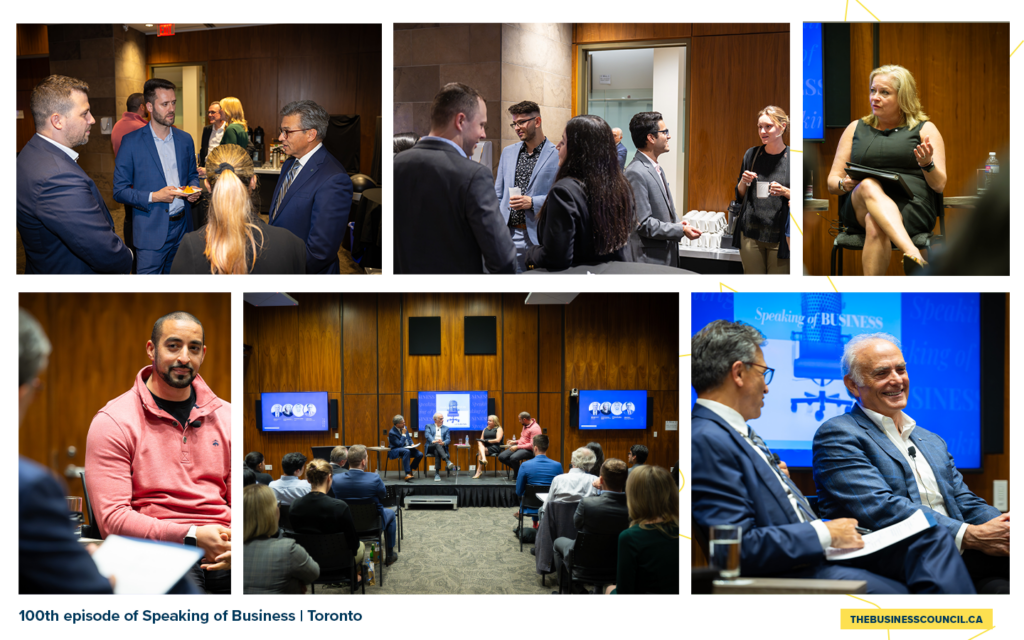Nicole Verkindt is the founder of OMX and Startup Canada’s 2017 Woman Entrepreneur of the Year.
OMX is a tech startup that helps companies access procurement opportunities and measure their economic impact. Nicole grew up in a family-owned manufacturing business and learned the risks of entrepreneurial life first-hand. She ran her own manufacturing firm before launching OMX at the age of 27.
In this episode, Nicole shares the challenges of attracting top talent; her experience as a female founder; and why she believes technology has the potential to make us all more human.
“I didn’t realize it at the time, but I had a front row seat to what I call the breakfast table business education”
Nicole Verkindt
Goldy Hyder:
Welcome to Speaking of Business, conversations with Canadian innovators, entrepreneurs, and business leaders. I’m Goldy Hyder, president and CEO of the Business Council of Canada. Today I’m speaking with Nicole Verkindt, founder of OMX and Startup Canada’s 2017 Woman Entrepreneur of the Year. OMX is a tech startup that helps companies access procurement opportunities and measure their economic impact. Nicole grew up in a family-owned manufacturing business and learned the risks of entrepreneurial life firsthand. She ran her own manufacturing firm before launching OMX at the age of 27. In this episode, Nicole shares the challenges of attracting top talent, her experience as a female founder, and why she believes technology has the potential to make us all more human. Enjoy our conversation.
Thanks for doing this, Nicole.
Nicole Verkindt:
It’s great to be here, Goldy.
Goldy Hyder:
Well, it’s good to see you. I’m really excited about getting into your story. You grew up in Caledon. Let’s start there. Tell us about life in Caledon.
Nicole Verkindt:
Yeah, I mean it was a bit of a quiet upbringing. My parents ran a factory nearby and we grew up on a farm. What does a six-year-old girl want When she moves to a farm? She wants a horse. And so we’ve just got some pretty funny stories growing up that are very innocent and involve a lot of rubber boots and driving a tractor and not the downtown Toronto thing.
Goldy Hyder:
Your family had a family business?
Nicole Verkindt:
That’s right.
Goldy Hyder:
GMA, Glenn Morris Associates. Tell us about the business.
Nicole Verkindt:
Sure.
They were engineering PVC materials essentially, and they were building Winterfronts for Bombardier. That was one of their products. I guess the original story goes in the ’70s long before I was born that they were sleeping in the factory. They had a cot there and they were ordering pizza from the same place every single night and the pizza was arriving cold. They wrapped the Bombardier Winterfront they were making around the pizza and they actually invented the pizza bag, and they sold that business off and continued on with Winterfronts and got into military contracts and grew it from there.
But everyone in the family was involved. Both of my grandmothers were the sewers. I had aunts working there.
Goldy Hyder:
What was that like?
Nicole Verkindt:
I mean, the big memory I have was that I don’t remember there being a distinction between working and living, and that’s something that I’ve carried on to today, that it was a life. And so some of my earliest memories are playing with bubble wrap in the warehouse and hanging around the guys working in the factory and spending Saturdays and Sundays there when we were building a new factory playing on the construction site.
I remember all of that as it was part of everything. What I didn’t realize, I realize it now, is that I was so fortunate because I had a front row seat to what I call the breakfast table education. I remember mornings my mother was cooking breakfast and they were arguing over some payable that was missing or somebody they wanted to fire or some contract that was delayed. It all soaked in that it was part of life. We had a major hiccup early on when I was young and we were building a house. I remember living in a trailer for three or four years as a kid on the property because we couldn’t finish building the house, and it was all connected.
I don’t remember feeling remotely upset about it because I was so young and it was an adventure, but it was all connected. We never went on a family vacation without having some stops at some customer or something along the way, so it was part of life
Goldy Hyder:
Growing up there you also had a chance to interact with the labor employees at the company. I understand many of them were from other parts of the world. How has that helped you and shaped you?
Nicole Verkindt:
That was the interesting part. The strategy that they took is my parents sponsored a huge number of immigrants to come into Canada. We had people from Cambodia, Pakistan, India, Vietnam, our head purchaser for 36 years or whatever. They were incredibly loyal and they became family. I remember having parties at the house and we had people from all over the world. It was just normal. That’s all it was. There was no thought about it.
But I don’t want to skip to the end of the story, but when I took the business over and we were in trouble and we were selling the company and I was looking at lists of people that had been with the company over 30 years, and they had grown up in the company. I remember my dad going to Vietnam later in life and he landed. There was 30 people there waiting for him. He said, “Well, I only ever had one person work for me from Vietnam,” but he had been sending money back for all those years. And so there was that real connection to the whole world, and these people just loved Canada. It was neat to have grown up in that environment.
Goldy Hyder:
You mentioned entrepreneurship and literally being at the breakfast table watching it all happen. That bug clearly hit you early because at 23 you decided to move to the Dominican Republic and start your own business related to the family business. Take us through that and how that came about.
Nicole Verkindt:
That right. I really struggled in university. I remember everyone telling me it was supposed to be the best time of my life and I had no idea what I was going to do with my life. I felt very out of place. Everybody at the business school-
Goldy Hyder:
That never happens to university students.
Nicole Verkindt:
Yeah, well, it was very cliquey and there was these two tracks. You’re either going to be an investment banker or a management consultant, and I didn’t fit in.
I ended up working on commission only in a sales job selling advertisements. If you open the middle economist, you get the middle there, the country report. Well, I saw those sausages getting made and that’s what I did for about a year. This company had sent me to the Caribbean and I had working around the Caribbean. At the same time, the demands in the family business were escalating with the Iraq War. We were providing shelter systems and different materials to that effort. And so the demands had increased dramatically, the suppliers were constrained immensely, and the US government had agreed to allow certain low-tech products to be made in the Caribbean.
And so it was a bit of a perfect storm. My dad came down and he me when I was working for the other company, and we dreamt up a way for me to start a company that was related in the supply chain. But I’d be taking out my own loan and I’d be hiring my own employees and I would own the company 100%. And so it was a really neat way for a 23-year-old to start a company.
Goldy Hyder:
Do you think he did that as a part of a plan?
Nicole Verkindt:
Yes, I think the whole time I was going through school said there was no way I was working in the family business. And so I think this was his way. I didn’t have a salary. I think that was key. I was just going to get the profits that were coming out of this business. It was a really great way to teach some hard lessons to somebody, and you have to learn them on your own.
But I look back and that was just an incredible three, four years getting that started and going. I didn’t speak the language. It was an absolute riot. I can’t believe some of the stuff we did to get parts out the door. I really loved the manufacturing experience and operations.
Goldy Hyder:
Now, shortly thereafter, the family business did get into a bit of a downturn, I guess partly because US military might’ve overestimated the requirement for some of the products GMA was making. And so it got into a bit of trouble and you moved back, you came back to Canada and you became director of sales and ultimately CEO.
Here you are doing the thing that you said you wouldn’t do. How did that all come about?
Nicole Verkindt:
Yeah, again, it was a perfect storm. The company had trotted along just over 20 million in revenue for a long time, and then it went up more than three times that size very, very quickly. Our customer had asked us to increase capacity dramatically, add huge factories in the States, hire hundreds more people, take on more debt, buy more equipment, all that stuff that comes with it.
They came to us in one fateful day in 2010 and said we were mistaken. The orders were wrong. In fact, what ends up happening with the US government is they’re not always buying to the actual end user’s demand. They’re buying, as you know with your experience in government, it’s colors of money. We were selling consumables, stuff that were destroyed. The end user demand was not lining up with the way they were spending money and they had overpurchased dramatically.
It was crazy how it all went down very, very quickly. We had about a year of backlog left at that rate, and we brought in somebody. It was after the crisis in Detroit with the automotive sector, and we brought somebody in that had restructured GM, an amazing guy. He was my right hand and he helped me restructure, reorganize the company. We got the company ready to sell to a US investor because our client at the time, US government, was insisting they wanted an American owner.
Goldy Hyder:
You sold it to a private equity firm?
Nicole Verkindt:
That’s right, and it was broken apart after that. It was sold into our competitors in each product line.
Goldy Hyder:
Where to from there?
Nicole Verkindt:
Well, it happened very suddenly and I was expecting to work for the private equity firm for years, but we didn’t get along. We weren’t on the same page. It was very sudden where I found myself not sure what to do. None of this stuff was a plan, but I’d had this gnawing frustration for years I had been participating in something called the Global Offset Association and-
Goldy Hyder:
What’s an offset? Let’s just get to that right away for our listener.
Nicole Verkindt:
It’s got nothing to do with carbon, I’ll tell you that, although I’ve been asked to do stuff in carbon.
But it’s actually an investment requirement that governments make when companies sell something to the government. If a company is selling something like a major infrastructure project or it’s quite big in the defense industry, then they’re required to source from local companies. That’s all it is. It’s a local procurement requirement. When I was working for the family business, I was using that mechanism to sell more of our product. We were Canadian based. If foreign companies had requirements to source in Canada, we were trying to push that as a means. We were using it as a sales mechanism.
I was participating in a lot of events and just found that everything was done in a very old school manner. You had to know somebody, you had to pay brokers, you had to pay percentages, and there was nothing peer to peer. I was operating my business world under that premise. But then all day every day I was using the internet. I was being connected online. I was seeing this wave of technology that was hitting every single thing except for the industrial industries.
I just always felt this frustration. I wasn’t sure exactly what it would be. I think a lot of entrepreneurs do well when they don’t know what their exact solution is going to be to the problem. They just know that there’s some inefficiencies in the market. I took some real time off. I wandered around India for six weeks, had nothing to do with the Eat, Pray, Love book. It was just I just took time off and read a lot of books. I’ve recently discovered that I really am an introvert. I took that time to really think through what I would be good at, and I wanted to try to bring some of my unique perspective and my age and my ability to use technology to a sector that I had gone quite deep on over the previous seven, eight years.
Goldy Hyder:
I’m going to come back to the OMX because there’s a lot to cover there, but I’m struck by your comment, “I’m an introvert.” You have this perception that CEOs and leaders are extroverted, but my experience has been, including in political life, they’re very introverted. Why do you think that is?
Nicole Verkindt:
Well, I always thought I was an extrovert because I like to party. It’s got nothing to do with it.
Susan Cain’s book Quiet is the book that was the lightning rod for me was where do you get your energy from? And so I find that after three or four or five nights of events and being out there, I feel depleted. I get energy from being alone or from being in a very small group, with family. I don’t know why that is, but I think to go out on your own and to be the one out front, the one taking the spears in the back, I think you have to be comfortable with yourself by yourself. And so maybe there’s that commonality in leaders that they’re okay to be by themselves.
Goldy Hyder:
Yeah, I find it’s the pressure of having to always be on, but when you’re alone, you don’t have to be.
Nicole Verkindt:
Yeah. I love reading and learning, and you can’t really do that when you’re out socializing so much.
Goldy Hyder:
Let’s go back to OMX. 2012, you decided to start up a company again. The entrepreneurial streak lived on. Take us through the thought process of setting it up again after having experienced your own challenges and watching your family business go through what it went through.
Nicole Verkindt:
I learned so much with the family business. When I was reorganizing that, I remember going through the expenses with a fine tooth comb and I couldn’t believe what we were spending with the Xerox company, for instance. I just had a real appreciation for what happens when you start to put tons and tons of overheads onto a company.
And so I was insistent that it was going to be lean, it was going to be a small team. We were going to be a tech-focused company. I landed from India. I’d read Steve Jobs biography and a whole bunch of others, and I was excited. I wasn’t sure what I would do, but I got introduced to somebody. The thing was I was going to have an early chat with him, so I went over to his office and I said, “I want to start a company. I have expertise in this industry and it hasn’t been digitized yet.” He goes, “Well, do you have a pitch deck?” “No.” “Do you have a company name?” “No.” I had some ideas and I had some esoteric weird Indian yoga infused name ideas that were horrible, and I said, “I really have nothing.”
This was the worst investor pitch you could have possibly done. He said, “Do you want lunch?” I said, “Sure,” so he went over to this Thai food restaurant and he wrote me a check.
Goldy Hyder:
Why do you think he did that?
Nicole Verkindt:
I don’t know. He believed in me. He said, “Every single industry will be digitized, and I know nothing about the industry you’re talking about, but it will be one day. It might not be ready for it, but it’s not a question of if, it’s a question of when, and that’s all I know.” He’s a crazy guy. He’s still on my board, but he wrote me a check right away. I didn’t have a company account, so I took the check in my name. I could have run.
Goldy Hyder:
Can I ask how big it was?
Nicole Verkindt:
I had 130,000, or maybe it was 180. It was 130. It was enough to hire an early developer and get things going and have a name and a website.
Goldy Hyder:
How did you land on Offset Market Exchange?
Nicole Verkindt:
He named it.
Goldy Hyder:
He named it?
Nicole Verkindt:
He named it. It’s actually OMX. We don’t spell it out ever.
I remember going home and I thought, “Oh, shit. This is real now.” It was a crazy idea before then, and anyone who asked, I said, “I’m thinking through my options.” But I said, “Oh, shit. This is real now,” so now we have to build something. From there we started copying together concepts. I brought a group of people in the industry together to give me some feedback on areas of their process they wanted to automate, and it evolved from there.
Goldy Hyder:
But it wasn’t a straight line. It wasn’t successful right out of the gate, that you had to learn from your mistakes.
Nicole Verkindt:
Yeah, we had lots and lots of mistakes. In fact, the original product we wanted to build is nothing like what we’ve built today. We originally wanted to do an exchange. We wanted to be able to swap obligations that you have, like a cap and trade system for investment requirements. Very different than what it is today. Today it’s more like a CRM for your supply chain. It’s quite different.
We faced a lot of criticism. I remember there was a director general in the government, and she was responsible for receiving the reports that our software would help to automate. It was like we were building TurboTax, and she might’ve been the one in charge of CRA, for instance. Highly, highly critical, said there was no way this would ever work. And then told our customers that we were an eyelash batting business because I was in charge of it.
And so we had a lot of pushback from the industry. We even had pushback from the advisory board that was designing the product. They were coming up with all the reasons why internally they’d never be able to get this adopted. That was a seminal point because I really had to ask myself if I should be doing this. But I didn’t have a choice. Once you take money from friends and family and some angel investors, you don’t have a choice.
Goldy Hyder:
What’s your reaction to that was not one of running. It was you said, “I got to keep going.”
Nicole Verkindt:
You can’t. I mean, if you hate your job, you can quit your job. You can’t when you take investors’ money. I didn’t take much, we didn’t raise very much money at all, but at that point we were living off some investors’ funds and we didn’t have any revenue. There wasn’t an option.
And so that’s where you go, “Okay, well, what are my options?” Optionality, which I didn’t even know was a thing, has become a bit of a theme for me now. Whenever you’re in trouble, you write down B, C, D, all the different options, and you run parallel paths along them and make sure that you always have options. Stopping wasn’t an option. We could have changed industries. We have done that, we’ve evolved into new industries, but stopping was never an option.
Goldy Hyder:
Nicole, I have to ask. How exactly does OMX help their clients?
Nicole Verkindt:
Any company, foreign or Canadian, and this happens all around the world, we work all around the world now, when they’re preparing their bid, they have to come up with their supply chain plan. They have to send out RFIs to local companies. They have to get bids back from those local companies based on the amount they think that’s going to cost them on their supply chain. They bid accordingly.
And then they have to demonstrate through data analytics, and this was traditionally all done manually, how that spreads out across the country and how that matches up with the government’s goals in investments. Some governments have pretty aggressive industrial policies, where take Saudi Arabia. They’re really trying to get that whole country out of the oil and gas industry and into new sectors. And so smart bidders will ensure that their supply chain plan reflects the government’s objectives in terms of where they want to go with their industrial policy.
And so we are just a platform for them to send out RFIs to connect in with companies. We’re a subscription-based platform, so large enterprise companies pay us thousands of dollars a month and small companies are free to a level. But it’s a freemium model so they can pay to use it for their own procurement or respond to certain things. It’s really around providing procurement opportunities and then rolling up data on what those impacts will be and then tracking against if they are successful, then they track against what they’ve committed.
That applies to everything. If you’re trying to get a pipeline approved and the basis of some of those permits and approvals are that you’re going to drive socioeconomic impacts, then let’s go the next step and actually track those commitments and roll up that data, apply some stats, canon multipliers to show real impacts to the economy. I believe it’s bigger than that because we’re also seeing major investment funds like BlackRock come out and say, “We only want to invest in publicly traded companies that can demonstrate their impact,” the ESGs, so environmental social goals.
I believe it’s bigger than that that companies have been using nice paragraphs to describe what they do, but we’re going to want to use data to tell us metrics, metrics, some real metrics, and that’s where we’re positioning ourselves as the platform to measure those metrics and then also execute to provide the procurement opportunities.
Goldy Hyder:
Now, we talked a little about defense, but it’s much more than defense the industries that you’re involved with.
Nicole Verkindt:
Yes. We’ve widened out. We sell to public sectors, so we’re powering supplier profiles and measuring impacts of public procurement and public deployment of funding. We work in the infrastructure sector. We’re doing a lot of work in mining, so measuring socioeconomic impacts and local spend around mining. That’s a huge thing all around the world mining companies have to do. Energy, so got involved in some companies with pipelines and energy projects, so it’s definitely widened out.
Goldy Hyder:
Did you ever contemplate getting a job when you just came back from India?
Nicole Verkindt:
Yes, I did. I just don’t think… I’m not sure that I’m hireable. I don’t know. I never went to an interview, I’ll tell you that.
Goldy Hyder:
Is it that, or is it the fact that a life that you knew was a life of entrepreneurship, a life of building businesses, a life of managing the ups and downs of building a business?
Nicole Verkindt:
I think you’re right. I think something takes over you and you can’t stop the train. It just starts.
I’ve been saying this for a long time people believe entrepreneurs have one eureka moment and maybe they do. They always say it’s in the shower. But I don’t think that. I think entrepreneurs have something gnawed at them over a long period of time and it gets bigger and bigger and the snowball gets bigger and bigger and bigger. You’re like, “I have to do this.” That’s been my experience anyways.
Goldy Hyder:
Do you think entrepreneurs are born or made?
Nicole Verkindt:
I think both. But even people in our team they all think like entrepreneurs now being around and being in that environment, and a lot of them have changed the way they think and the way they think about things. I think you can absolutely train the entrepreneurial mindset into people.
Yeah, some people are just born. When I look back, even as far back as high school, I remember always having different ideas and different things and always being out front leading different initiatives. I think I was born an entrepreneur, for sure.
Goldy Hyder:
You mentioned that you’re expanding outside of Canada, so obviously you’re getting a chance to see Canada and how it stacks up with other countries and other regions around the world. What’s your sense?
Nicole Verkindt:
Well, obviously I love Canada.
I am worried. I’m worried for a few reasons. I can see the reaction that I get trying to sell our solution into large companies and the reaction I get from people in those companies, and it’s this very nice, apathetic almost reaction. We’re very comfortable and there isn’t a sense of urgency. We need to be better. Or maybe it’s because Canadian companies are branch plants of foreign companies. There’s a lot of examples of that.
But when we go to the States, we pitch similar titles, similar people in organizations, and they get enthusiastic. They get excited. They want to embrace new things. They have this sense where every quarter and every year needs to be better and that they want to beat their competition. They want to use the latest thing. And so I’m worried about that general trend, and I saw it when we were raising capital as well. I saw American investors have a slightly different approach than Canadian investors that are so much more risk-adverse. And so I am worried about that, and I’m worried about the long-term impacts of that, our inability to embrace change and take risks.
Goldy Hyder:
Do you think that the day may come where you have to leave the country? I mean, do you have to make it somewhere else?
Nicole Verkindt:
I’ll never leave the country. Famous last words, right? The benefit of a technology solution is you can sell it around the whole world from one place. That is pretty amazing about what we’re doing. I mean, we’ve been working this project in Poland for the last… None of us have traveled there. The entire thing has been virtual. Canada, and Toronto in particular, is very well positioned to service the whole world, especially with digital offerings. Our team is incredibly diverse and we can sell all around the world from one location.
Goldy Hyder:
But are Canadians ripe for risk taking, trying new technologies, new suppliers? Are you finding it easier to do it in other parts of the world and then you come back and reinforce…
Nicole Verkindt:
I’m finding it easier in particular with American companies to do it in the US.
Goldy Hyder:
Why do you think that is?
Nicole Verkindt:
I think there’s a cultural difference. Of course we can celebrate the benefits of our culture. We didn’t have the same financial crisis. There’s benefits to our culture for sure. But in terms of selling and saying we’re going to close in May and then they actually close in May, they don’t push it out another four or five, six months, there’s something about the American culture that I have for us has been, we’ve had more success with it.
Goldy Hyder:
Are we complacent, comfortable?
Nicole Verkindt:
Maybe afraid of something.
Goldy Hyder:
I mean, it’s hard. We live with the elephant.
Nicole Verkindt:
Yeah, I’m not sure. There’s a weird psyche in Canada. There’s also a bit of a tall poppy syndrome. I’ve heard it called the Shania Twain effect. You have to make it in the States before you can make it here. I used to hear that and think it was funny, but when you start to live it, you go, “Oh, really?” It’s sad.
Goldy Hyder:
Now, of course we’ve got at the Business Council of Canada, you involved as one of our co-chairs of a task force on Canadian competitiveness and really about building an economic plan for the future. You’re working with Chuck Magro, CEO of Nutrien, and Louis Vachon of National Bank. What exactly do you hope to achieve, and what can we expect from the task force as we go forward?
Nicole Verkindt:
I’m really excited about this. I’ve always had in the back of my mind, what do we need to do as Canadians to really be more competitive for our economic future?
I’ve always had it as something that I’ve really cared about and thought about, and so this is an exciting time for us to get the smartest minds around this country to be collaborative about the process and to come up with some clear, concise things that we can actually do collectively. Maybe that the government can do, that companies can do, but some very specific things and things that can be accomplished in a certain amount of time, so not something so big that it’s almost too big to handle. I believe the embracing of innovation is one of those things for sure. That’s going to probably very likely be one of the pillars.
Goldy Hyder:
It seems to me that we have a history of doing things incrementally, that we don’t take big bites. Nothing wrong with that, and there’s probably a lot of low-hanging fruit in terms of moving forward.
Now, I’m aware obviously that the verticals that you’re looking at in this task force are about people and about the economy and about country. It doesn’t sound like it’s going to be the natural things that businesses talk about. What are you doing to make sure that this is a more inclusive exercise?
Nicole Verkindt:
That’s a great point. Something that we’re trying to really focus in on is connecting the dots, so connecting the dots to how this affects the average person. And so the average person that’s waking up and going to work, and maybe it’s in a factory, how does, say, our tax policy or the regulation that we face in Canada or our inability to embrace technology and be competitive and sell around the world and be the best at something, how does that impact that person’s job? How does that impact that person’s future? How does that impact that person’s children’s ability to work and go to school and best of…
We have the best of so much here in Canada of healthcare and education, but we can’t forget what has allowed us to have that. That’s been driven by our success economically and our success as a country. We punch way above our weight in lots of areas around the world. But if we don’t continue to do that, then the entire country is going to suffer. And so we want to be very cognizant, and maybe that’s one of the reasons why I’m involved, for not to appear like it’s just a bunch of CEOs that have been CEOs of huge companies for a long time. They’re griping about a few things that impact them personally or their levels in the company personally. It’s got to be about what does the whole country have to do to ensure the entire country benefits over the long term?
And so if we have to connect those dots for people, then we’re going to be doing that. I’ve been doing it on one-on-ones with various people, and they don’t even know there’s something they should be worrying about.
Goldy Hyder:
Again, back to the comfort.
Nicole Verkindt:
Yeah.
Goldy Hyder:
Do you think at times that maybe we really need a reality check, right? That what we’ve done as a country to get to this place, there’s no guarantees, it just goes on?
Nicole Verkindt:
Right. I think that’s the problem is we take it for granted and we are just so lucky, but it’s like I had the flu last week and I never realized how lucky I am when I don’t have the flu because we haven’t experienced the other side of it, really. Not truly.
Goldy Hyder:
Luck can run out.
Nicole Verkindt:
Luck can run out and luck can only do so much for you. You have to work for things. And so I think it’s important that we feel this urgency as if the sky is going to fall tomorrow and we feel it and we actually make changes as if it were a crisis. But we don’t see it as a crisis because life goes on and everything’s the same, and we can still shop at the same places. The job market’s quite tight. A lot of people have jobs today. We don’t see it as a crisis, but we need to.
Goldy Hyder:
When you travel and you see other parts of the world, how do you think we stack up in terms of our future, in terms of our infrastructure, in terms of our talent and our skills, our ability to be innovative? There’s got to be places in there where we’re strong and places we’re not, but how do you see it?
Nicole Verkindt:
As a country and the social structure, I think that we’re unbelievably strong. I mean, I spent three years with GMA living in a rural part of Michigan, and you compare those two, it was two hours away from Canada, and it was night and day in terms of, like I said, education and social systems. The talent that we have here is unbelievable. We’ve been able to recruit people from all over the world to come work for us. I know lots of companies are able to do that, and they’re coming because of the country. They’re coming because they want to be here.
I believe we live in the best country in the world, but there are just some areas like we talked about where I think we could just be a little more aggressive. That might be cultural but also even just policy-wise. I think that we need to allow energy projects and push for energy projects to happen in Canada. We need to not apologize for the fact that a huge part of our exports are energy-related goods, and we need to be really good at shipping that around the world. Same thing goes for getting complex projects going and approved, and then there’s just so many areas where I just think we could be more aggressive.
Goldy Hyder:
What about when it comes to talent? Because I think that’s one of our strengths. You’ve mentioned it. But when you’re hiring and what kind of skills are you looking for, and are you able to find the talent?
Nicole Verkindt:
It’s been a big struggle on the technology side, so attracting engineers is a battle, especially in Toronto.
Goldy Hyder:
Why?
Nicole Verkindt:
There aren’t a lot of them. We build our software in a language called Ruby, and a lot of the big software companies, including Shopify, The Score, many companies build in the same language. There’s a huge demand for individuals to have experience in that language. The salaries are being pushed up very quickly and the rest escalating quickly, and companies who have gone public and have tons of cash are able to offer all sorts of things that we wouldn’t be able to compete with.
Recruiting on the technical side has been a challenge, and the approach that we’ve taken has been that we’re recruiting from people who are based all around the world. We work with them to get them a visa to come to Canada. And so like I said, the pitch is all about Canada, but within Canada it’s been a huge struggle.
Goldy Hyder:
But are you able to recruit successfully from abroad?
Nicole Verkindt:
We are, yes. Yeah, we are. There are lots of countries. Very recently got some folks from Venezuela. There’s lots of countries where people feel uncertainty.
Goldy Hyder:
Now, we’ve seen around the world largely in Western democracies, whether the United Kingdom, United States, Germany to some extent, Italy, France, a real rise of maybe strong to say an anti-immigrant sentiment or close the door kind of sentiment. Do you think that might happen in Canada?
Nicole Verkindt:
I think it could. I think we need to be aware that it could. That’s the one big downside of social media and our networked economy is that it creates these echo chambers and people with extreme views find each other. We know that there is a following in Canada of people that had those views.
Again, with the complacency, I don’t think that we should assume it will never happen because that’s not the general sentiment now and because we’re seen as this place that is so welcoming. But we need to be aware that that is definitely something that is out there, and we have to be very careful.
Goldy Hyder:
Well, what you said of course is we need the talent.
Nicole Verkindt:
We need the talent. The talent is what fuels everything, especially this new economy that we’re entering. I love the first book that you sent all the BCC members about the new power, but this new economy that we’re entering where it’s going to be driven by AI and it’s going to be driven by data and it’s going to be all about people who are creative, who have good judgment, who have different skills.
It’s not going to be about data entry anymore. And so we need the top talent from all over the world. I know we have a point system with immigration, but I’ve always believed that we should be having people go around the world and grab the top 5% of universities in India and China and everywhere and recruiting them and doing what it takes to get them here. Because when foreign students come to our universities, they so often stay. That tends to be how they immigrate here is what I’ve seen from experience. But we’re going to need those minds. We have a small population, so we’re going to need them to grow the economy.
Goldy Hyder:
Do you understand the angst and anxiety that many feel, including immigrants, I will point out in Canada, about the notion of let’s add more people? They have their own basis of feeling that way. They don’t want to be stuck in traffic, they don’t want to have to compete a little bit extra if one of their kids has to go to school, more competition. How do you deal with that real emotion that people feel, as good-hearted and as good-natured as Canadians might be?
Nicole Verkindt:
You’re right. There’s going to have to be a connection to sort the macroeconomic realities of you cannot grow your economy by our standard 2% that we’ve been needing to grow the economy, to keep up inflation-
Goldy Hyder:
Right about I now we’d kill for 2%.
Nicole Verkindt:
We’d kill for it.
You cannot grow your economy, you cannot be competitive around the world without growing the population. We’re so lucky because we’ve got a very developed country and there’s a lot of people that are having less children. We’re not growing as quickly as we might have in the past. You need talent to grow and to thrive and to have those opportunities. Traffic, take that for example. Well, maybe we should be looking at some major investments in infrastructure.
Goldy Hyder:
Which again, when you travel around the world and-
Nicole Verkindt:
I was just going to say that.
Goldy Hyder:
… you see what’s say’s going on in so-called emerging markets-
Nicole Verkindt:
I’m going to Tokyo in a few weeks. They-
Goldy Hyder:
Yes, I just recently did that bullet train.
Nicole Verkindt:
Yes, you were. But to say that Toronto is overcrowded, they would laugh at us like, “Oh, look at those country bumpkins in that field with a few people says it overcrowded.” There’s cities that have figured this out before us. If we’re going to be a real city and real country, then we got to step up.
Goldy Hyder:
What’s keeping you up at night as a leader today?
Nicole Verkindt:
Well, I’ve always been in a hurry. I don’t know why, but I’ve always had this sensation of being in a hurry. And so what keeps me up at night is genuinely the length of time it takes to get things done in the environment that I work in. Constantly I’ll be thinking that we’ll be onboarding a new project, and we’ll hear back that it’s delayed another six months.
And so that really happened to us through 2018. It was a very frustrating year, but of course 2019… That’s the key about being an entrepreneur. You got to stay alive long enough and all these seeds that you’ve planted start to sprout. We’ve had a great year already this year, but that’s what keeps me up at night is I’m in a rush, I want to get things done, I want to move on to the next challenges. It’s delays and things that take a long time.
Goldy Hyder:
Now, you mentioned earlier as a privately held company, you’re able to do a number of things. Do you have a plan to go public in the future?
Nicole Verkindt:
No, I do not plan to go public. Actually, I experienced going public on the board of a cryptocurrency company, and I just think it changes the dynamic too much. We’re able to move fast. They say move fast and break things, but that might scare some of our clients up there. But we’re able to move fast, we’re able to make decisions quickly, and we’re able to invest for the long term.
I have an amazing board of people. They’re like mentors to me and they’re in it for the long run as well.
Goldy Hyder:
We like to talk about leadership on this podcast. Take me through what leadership means to you.
Nicole Verkindt:
I think at the very start it’s about having someone who’s energized around going in a certain direction. I think I’ve come to realize that you can’t have leadership without that initial very intense enthusiasm around what a vision is and what a long-term goal or plan is. I think that’s the absolute crux of it is the start of that enthusiastic, infectious energy about why something’s going to work and why something’s going to make something better. I believe that’s the start of it.
And then from there, I’ve always said I’m an absolutely horrible manager. I could never be a manager in a company. I think from there it’s around surrounding yourself with people who are leaders themselves and who are self-starters and who see the vision and maybe have a tweak to the vision. For me, it’s been about execution. Even running GMA, it was all about leading through even by example. Look, we are all working hard and we’ve all divvied up what we’re doing.
I think it’s a combination of those things. It’s something that’s hard to describe, though.
Goldy Hyder:
You just mentioned that you’re not a good manager. Do you think you need to be be a leader?
Nicole Verkindt:
Well, when I think of a manager, I think of somebody that’s really detail oriented.
Goldy Hyder:
Tactics.
Nicole Verkindt:
Yes.
Goldy Hyder:
And execution.
Nicole Verkindt:
They’re good at following up.
I also think of the word babysitter when I think of the word manager, right? And so if somebody was told to do something, then I follow up and make sure that that gets done. And so for us, I mean we still have a very small team, but in my whole life and leading organizations it’s been around making sure you have people around you that are entrepreneurial and that you feel that they are self-starters. They manage their own to-do list, and that you’re living a little bit more above the waves, that you’re not in there doing it for them. That you are saying, in the case of me starting the Dominican company, “We need to get this shipment out by this day.” It wasn’t about did that stitch get done that way. It was about the process and more of the higher level things.
I think when I say that, that’s more what I mean.
Goldy Hyder:
Now, I can say this, you’re a young woman, you’re a leader, you’re a CEO, you are a next gen leader from our business council of Canada, surrounded by, as you pointed out, the who’s who of the business community. How is it for you to be interacting and being engaged with CEOs of multinational, large publicly traded companies? How do you feel when you’re in that room?
Nicole Verkindt:
Well, three years ago, my first meeting was definitely intimidating.
It’s interesting. I feel like the next gen leaders, the few of us that are running innovative startups, I believe we truly have something unique to bring to the table. I remember the very first dinner in Munich with the BCC. We were talking about blockchain, and I was with another next gen leader. We were rambling on about crypto blockchain. A few of the regular BCC members said, “Well, slow down. Slow down. Stop, start again.” It was fun. It was great because I believe that we were actually adding value to the conversation.
Goldy Hyder:
You were adding the value and you were leading the conversation.
Nicole Verkindt:
Yeah, so kids these days.
Goldy Hyder:
On a more serious note, the last little while here the whole Me Too movement has really dominated conversations. Not just in the entertainment sector, but I think far beyond that. Certainly, it seems to be prevalent in the business community as well. What do you think the takeaway from all of that is, and where do we go from here?
Nicole Verkindt:
It’s amazing how the Me Too movement came about so quickly, and that’s as a result of this new networked world that we’re living in. And so that’s a lesson in itself.
The Me Too movement had some real negative impacts for women like me in business because you have a reaction now for men that say they don’t want to be alone with women. They call that the Mike Pence rule, right? Never be alone with a woman because you might be seen as harassing her. And so they just recently surveyed men at Davos, and the number of men that are following that rule have gone up by three times. There’s been a negative backlash from Me Too because of that. In order for people like myself to be successful, we need to be mentored, we need to be sponsored.
Being sponsored is very different from being mentored. It’s somebody actually helping you. For me, it would be trying to get a sale or get in with a project or that kind of thing. If I was in a big company, it would be recommending me for promotion. You need people, and most often you need men because they are more often in leadership positions, to sponsor and mentor and lead you. How do you do that? Well, you often go for lunch alone, or how else are we supposed to be having a conversation? I think that’s a real negativity from the Me Too movement.
On the flip side, I think it started a real conversation and we’ve started to see some changes, which is amazing. We’ve seen some examples of men that have had to step down because of years of bad acting, and they deserve it. I’m glad that it’s happened to them. I didn’t participate in the Me Too movement per se. I had a very unique situation in that I was an entrepreneur. The way I experienced Me Too was in somebody I was trying to sell or somebody I was trying to raise capital from that would only meet me for a drink and then try to hit on me. There’s nothing you can do. You can’t go to HR. You just have to move around them and find another way around it. But it does weigh on you over the course of years of trying to grow an organization and make something work.
Goldy Hyder:
What advice would you give young women and men today?
Nicole Verkindt:
I really do believe that men that are coming out are different. I do. I think they’ve gone through university in a different time.
But I think for men, if they’re going to mentor a man, they should be mentoring women as well. If you’re going to be spending time alone with a man, you should do the same thing with women. The Mike Pence rule is something that I really hope men don’t take seriously.
For women, I mean, it’s complicated and it’s hard. The only thing that worked for me is, like I said, to go around that person. I tried to expend the least amount energy on situations like that.
Goldy Hyder:
Moving on to other subjects then, you’re a big user of social media. We talked earlier about the good and the bad of social media.
Nicole Verkindt:
Yes. I think there’s definitely a negative side to it. I’ve seen a lot of young people come in and work for us, and they’ve got it on their lap and their Snapchat while they’re trying to work. And so there’s a huge distraction factor.
There’s this huge factor of people looking in on other people’s lives and thinking that they’re not adequate, too. I also believe that some of the social media that’s out there is going to be our cigarettes. Now we think it would be crazy to smoke. But 20, 30, 40, 50 years ago, it wasn’t. And so I think in the future, the idea of sitting on social media and being consumed by it is going to be seen as something that’s a really bad habit and that it’s really bad for you and bad for your brain and bad for your well-being.
Goldy Hyder:
What about the upsides? I mean, it’s an engagement tool. It’s a great equalizer for many people.
Nicole Verkindt:
Oh, yes, it’s a great equalizer. We are moving to this networked economy, and I believe it’s going to demand a totally different style of leadership. It’s going to demand more transparency, more engagement directly with the end user. We’re going to go more peer to peer, and I think it’s going to be very, very positive for a lot of reasons. I think it’s opening doors for people that never would’ve been able to. It’s giving access.
I’ve heard of kids in rural India that are getting scholarships to MIT because they’ve gone on the Khan Academy and they’ve engaged online and they’ve been able to show these incredible test scores. I think the internet and social media and this networked economy that we’re moving to is creating a big shift in the style of leadership that is going to be demanded of organizations if they want to survive. I think that the technology is a key part that’s driving the social change, so I’m an optimist when it comes to the impacts technology will have, for sure.
Goldy Hyder:
Well, on that note, nice segue, I had read a quote from you that said, “Technology makes business more about human relationships.” Now, that’s the reverse of what many people would assume. What were you getting at?
Nicole Verkindt:
Well, I think AI and some of these technologies, if they’re used properly, they’re going to take the drone activities out of a lot of people’s lives. You’re not going to be just doing data updates, for instance. I think it’s going to put the onus on people to use their people skills. That’s the one thing technology will never be able to do. It’s going to put the onus on us to be creative, to come up with new ideas, to engage.
We’re seeing an increase in events that are happening around the world in business to business, people getting together in person. I believe that technology will be our tool. Humans will use it as a tool. Some people have these beliefs going to take over, but we’re designing technology to work for us. And so I believe that it’ll be our tool and it’s going to free us up to do other things. If we’re working in collaboration with technology, there’s some areas technology will never be able to do. It will not have humor. It will not be able to relate. It will not be able to-
Goldy Hyder:
Can’t have our heart.
Nicole Verkindt:
Yes, exactly. I believe that our future will be about technology freeing us up to do more of that.
Goldy Hyder:
Well, that’s a very positive note to wrap up. Probably very fitting given everything we’ve heard about you.
But as you know, before we end, we like to play a little word game. I’m going to say a few words and you’re going to tell me the first thing that comes to your mind.
Nicole Verkindt:
Uh oh.
Goldy Hyder:
All set?
Nicole Verkindt:
Yes.
Goldy Hyder:
This is where you get in trouble. All right, here we go. Disruption.
Nicole Verkindt:
Energy.
Goldy Hyder:
Entrepreneurship.
Nicole Verkindt:
Energy.
Goldy Hyder:
Social media.
Nicole Verkindt:
It could be dangerous.
Goldy Hyder:
Charity.
Nicole Verkindt:
Transparency.
Goldy Hyder:
Innovation.
Nicole Verkindt:
Disruption.
Goldy Hyder:
Canada.
Nicole Verkindt:
The future.
Goldy Hyder:
Thank you for doing this, Nicole.
Nicole Verkindt:
Thanks, Goldy. It’s been great.
Goldy Hyder:
Thanks again to Nicole Verkindt for being my guest on this episode of Speaking of Business. Subscribe now for more conversations with Canada’s top innovators, entrepreneurs, and business leaders. Search Speaking of Business wherever you find podcasts. Or visit speakingofbiz.ca, that’s biz with a Z, to join our email list and follow us on social media. Until next time, I’m Goldy Hyder.
















